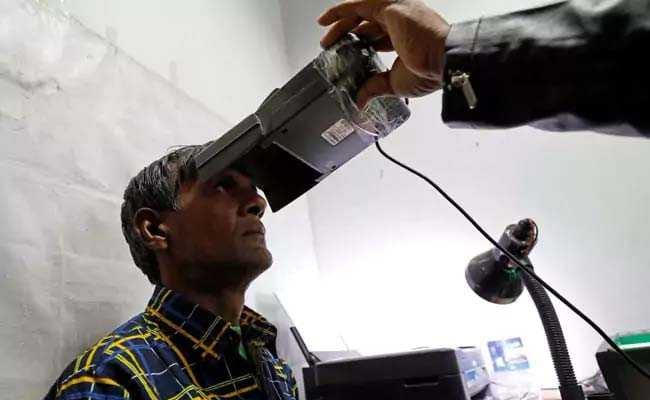
Supreme Court questioned the centre on making Aadhaar mandatory for all services.
NEW DELHI:
The government's decision to use Aadhaar to reach benefits to the poor, curb money laundering and protect tax collections is understandable, the Supreme Court remarked on Thursday. But, the Supreme Court asked, could the government go on to make Aadhaar mandatory for every transaction. "There comes the problem," Justice DY Chandrachud observed, wondering if this would meet the test of proportionality.
Justice DY Chandrachud is one of the five judges on the constitution bench hearing a bunch of 27 petitions challenging the citizen identification programme. The petitioners including a retired judge contend that the programme, powered by a law pushed through parliament in 2016, invaded the privacy of people.
The 2016 law empowers the government to order people to submit their Aadhaar to identify themselves to access not just subsidies but practically any service or facility.
"You (centre) want Aadhaar for each and every activity. You have issued 144 notifications. Why do you need cellphone linked to Aadhaar? You consider every individual as a terrorist or violator?" Justice AK Sikri asked.
The centre's top law officer KK Venugopal promptly responded that people were asked to link Aadhaar because terrorists in Jammu and Kashmir easily got SIM cards. The judges weren't convinced.
"We are not questioning the wisdom of the government but I don't think terrorists get SIM cards. They use satellite phones," Justice Chandrachud shot back.
The top court had last month put on hold a government rule that mandated people to link their mobile phone numbers to Aadhaar by March-end, ruling that it could not disconnect phones for non-compliance till the judges decided the Aadhaar case.
The government introduced the rule, citing a 2017 verdict by the Supreme Court that supported verification of the identity of pre-paid mobile subscribers.
A nine-judge bench of the Supreme Court had last year held that privacy is a fundamental right, a question that was triggered by the NDA government which insisted that constitution makers did not intend to make privacy a fundamental right. That line of argument in the top court was seen by privacy campaigners as an attempt to buy time. The government had pushed through the Aadhaar law months later.
"What's the use of fundamental right of privacy when people are starving," the centre's law officer argued in the Supreme Court on Thursday, insisting that Aadhaar doesn't violate the right to privacy.
Justice Sikri, however, rebutted the argument, wondering how people could be forced to give up one right to access another. "If we go by your logic, then can a person say give food, clothing and shelter, I will be your slave?" he countered.
The judges, who have been hearing from the government how Aadhaar helped counter fraud, pointed that it couldn't do much about bank frauds and bad loans. "Aadhaar cannot stop such frauds," Justice Chandrachud said. Mr Venugopal, the top law officer, agreed with this assessment, adding that only due diligence by banks could help deal with this problem.
Justice DY Chandrachud is one of the five judges on the constitution bench hearing a bunch of 27 petitions challenging the citizen identification programme. The petitioners including a retired judge contend that the programme, powered by a law pushed through parliament in 2016, invaded the privacy of people.
The 2016 law empowers the government to order people to submit their Aadhaar to identify themselves to access not just subsidies but practically any service or facility.
"You (centre) want Aadhaar for each and every activity. You have issued 144 notifications. Why do you need cellphone linked to Aadhaar? You consider every individual as a terrorist or violator?" Justice AK Sikri asked.
The centre's top law officer KK Venugopal promptly responded that people were asked to link Aadhaar because terrorists in Jammu and Kashmir easily got SIM cards. The judges weren't convinced.
"We are not questioning the wisdom of the government but I don't think terrorists get SIM cards. They use satellite phones," Justice Chandrachud shot back.
The top court had last month put on hold a government rule that mandated people to link their mobile phone numbers to Aadhaar by March-end, ruling that it could not disconnect phones for non-compliance till the judges decided the Aadhaar case.
The government introduced the rule, citing a 2017 verdict by the Supreme Court that supported verification of the identity of pre-paid mobile subscribers.
A nine-judge bench of the Supreme Court had last year held that privacy is a fundamental right, a question that was triggered by the NDA government which insisted that constitution makers did not intend to make privacy a fundamental right. That line of argument in the top court was seen by privacy campaigners as an attempt to buy time. The government had pushed through the Aadhaar law months later.
"What's the use of fundamental right of privacy when people are starving," the centre's law officer argued in the Supreme Court on Thursday, insisting that Aadhaar doesn't violate the right to privacy.
Justice Sikri, however, rebutted the argument, wondering how people could be forced to give up one right to access another. "If we go by your logic, then can a person say give food, clothing and shelter, I will be your slave?" he countered.
The judges, who have been hearing from the government how Aadhaar helped counter fraud, pointed that it couldn't do much about bank frauds and bad loans. "Aadhaar cannot stop such frauds," Justice Chandrachud said. Mr Venugopal, the top law officer, agreed with this assessment, adding that only due diligence by banks could help deal with this problem.
Track Latest News Live on NDTV.com and get news updates from India and around the world

